The 9 Best Zombie Movies That Feel Really Realistic
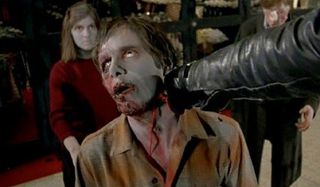
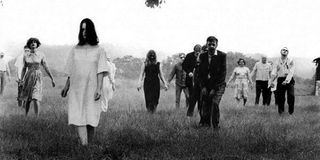
What is scarier than a machete-wielding maniac in a hockey mask or an abandoned mansion where vengeful spirits lurk? If you ask me, zombies are the most horrifying concept in horror cinema and zombie movies are among some of the finest in the genre.
Some may ask, "Why? How does the idea of a hungry, rotting corpse suffering from rigor mortis sound scary? It's completely impossible!"
Not to say that these naysayers are wrong, and even television shows (see The Walking Dead), exploring the concept of the rise of the undead have provided thought-provoking looks at how society is consumed by chaos, widespread hysterics, senseless violence, and our own loss of humanity. So, while the supernatural plot device may not be as convincing, the message is shockingly believable.
Through generations of zombie movies from the works of George A. Romero to Jim Jarmusch's upcoming The Dead Don't Die, what cinematic tale of gore and survival challenges our beliefs most effectively? I have picked eight iconic creature features (and one franchise that you could probably guess) and rank them by how realistically they imagine a world that has been overrun by the dead.
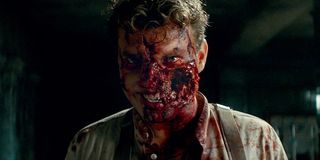
9. Overlord (2018)
Gamers all over the world eyed this J.J. Abrams-produced gem with ecstatic anticipation that they were finally seeing the film adaptation of the zombie-inspired levels of Call of Duty they had dreamed of. As it turns out, it is not the Army vs. undead splatterfest they expected, but that is essentially what helps Overlord maintain some shred of plausibility.
As a twist on true accounts of human experimentation by the Third Reich during World War II, Overlord follows a small group of American soldiers who discover the Nazis’ scientific approach to achieve immortality has spawned horrifying results.
The film is more war than gore, with references to reanimated corpses and violent mutants appearing less frequently than traditional armed combat, but a zombie outbreak on the eve of D-Day would have had you shaking your head, saying, “That never happened.” Overlord keeps it covert without beating you over the head with its horror elements, resulting in a WWII fantasy more believable, at least, than Inglourious Basterds.
CINEMABLEND NEWSLETTER
Your Daily Blend of Entertainment News
Speaking of Brad Pitt...

8. World War Z (2013)
Author Max Brooks stated in the documentary Doc of the Dead that zombies do not scare him; he is not convinced by the idea of cannibalistic reanimated corpses at all. What does scare him is the concept of a virus powerful enough to create widespread mania and destroy humanity as we know it.
Max Brooks took that approach to his novel, World War Z, framed as an oral history of an epidemic turning people into ravenous, flesh-craving mutants, which producer and star Brad Pitt made into this action-packed disaster flick.
The film manages to treat the subject matter maturely, not treating its zombie themes as excuses for gore or even going for the apocalyptic aftermath route. Instead, it puts you right into the middle of the event, as Pitt’s United Nations investigator struggles to figure out the cause and, hopefully, the cure for this international catastrophe, while also serving up potent political commentary.
However, I cannot say I find mindless flesh-eaters smart enough to climb a several-hundred foot wall particularly realistic, so it loses points there.
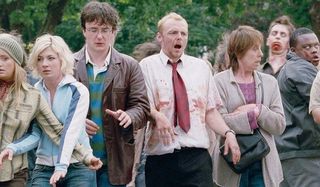
7. Shaun Of The Dead (2004)
Despite being pretty straightforward, Edgar Wright’s Shaun of the Dead still managed to become one of the most iconic movies of the zombie genre. The key to Shaun of the Dead's success, and its realism, may be its highly relatable characters.
Shaun (co-writer Simon Pegg) and Ed (Nick Frost) are a couple of average slackers who are far from prepared to take on a horde of undead overrunning London, leading them to make some very bad decisions as they struggle to avoid the fate of the infected. But how can you blame them?
The characters’ ill-advised efforts only make them more authentic and, while they also serve as setups for some memorably hilarious moments, they lead to heartbreaking consequences that make you wonder why you were laughing in the first place. People are dying here!
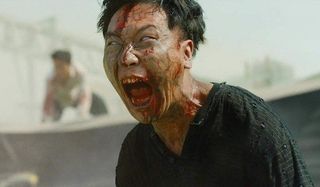
6. Train To Busan (2016)
The Korean horror extravaganza Train to Busan may be the most potent example in recent memory of the key elements of a perfect zombie movie: relentless terror, critical thinking, and a heart.
A divorced businessman (Yoo-Gong) is taking his daughter (Su-an Kim) on a train from Seoul to Busan to visit her mother when a woman infected by a mysterious virus comes aboard. Infection breaks out as the passengers find themselves trapped in a mobile fight for survival.
Train to Busan is a brainy, highly entertaining, no-holds-barred gore fest that is not for the faint of heart, but the scariest thing about the film is not the cannibalistic monsters just one train car away. It is the constant dread of being caught in uncontrollable chaos and the lengths one must go to protect loved ones and even strangers alike.
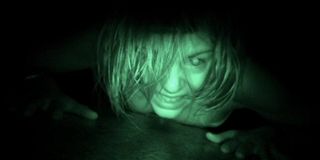
5. [Rec] (2007)
Before the found footage horror trend took its time running itself into the ground, many credit this Spanish-language thriller as the genre’s peak of brilliance.
[Rec] follows a young television reporter and (Manuela Velasco) her cameraman (Pablo Rosso) who become trapped inside an apartment building experiencing an outbreak of a deadly virus turning its victims into hunters and the uninfected into their prey.
Directors Jaume Balagueró and Paco Plaza use the found footage method as an effective way to authenticate [Rec]’s horror elements and take advantage of its singular internal setting to provide the audience with a first-hand, claustrophobic experience that feels almost too real to handle.

4. Colin (2008)
Zombie movies are always concerned with how the living deal with the dead. This low budget British thriller asks the question, “How do the dead deal with being dead?”
Alastair Kirton stars as the title character of Colin, who discovers a zombie bite on his arm within the first few minutes of the film. Following his death and reanimation, he serves as our apocalyptic tour guide, mindlessly stumbling through the wreckage of suburbia longing to satisfy his new appetite.
Colin features top-notch acting and surprisingly good special effects for one, but its most impactful moment comes when Colin comes across his own family, horrified to discover their loved one, who can’t even recognize them, is now their greatest danger. It is a thought-provoking reminder these monsters steal not just human lives, but also humanity, and sees the traditionally feared undead earn our unexpected sympathies.
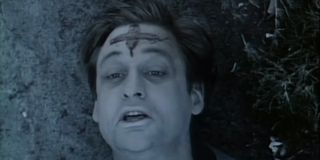
3. The Serpent and the Rainbow (1988)
Today, the term “zombie” is often associated with rotting corpses seeking fresh, live meat, thanks to George Romero, but if you look back to the first inception of the concept, it gets a little weirder.
Directed by Wes Craven, The Serpent and the Rainbow focuses on the concept of black magic, which anthropologist Dennis Alan (Bill Pullman) travels to Haiti to investigate following reports of a drug resurrecting people from the dead. His findings bring him closer to the truth than he wanted, as, not just his life, but his soul soon becomes threatened.
The film is a return to the origin of zombies, defined as corpses reanimated by the use of witchcraft as a tradition of Haitian folklore. While still regarded as a supernatural thriller by execution, considering its nightmarish themes and historical significance, it sure makes you want to steer clear of voodoo.

2. George A. Romero’s Dead Series (1968-2009)
For the definitive depiction of a soulless, subhuman flesh-eater that we have come to know, love, and fear, we have the late George A. Romero to thank.
After first introducing us to the modern incarnation of the zombie in 1968’s revolutionary Night of the Living Dead, Romero kept bringing us back to his nightmarish vision of survival and carnage throughout the decades with more iconic films like Dawn of the Dead, Day of the Dead, and Land of the Dead, imposing a new concept of potent social commentary with each.
He even took advantage of the found footage trend with Diary of the Dead in 2007 and a more sympathetic approach to his monstrous creations with Survival of the Dead two years later.
Despite inspiring many films to come forward later, what keeps Romero’s Dead series standing out among the rest is how their highly plausible depiction of the aftermath of chaos and how they serve as a reflection of human nature, commenting on topics like race, modern consumerism, and war.
But, if we’re talking about realism here, even Romero can’t beat this modern classic.
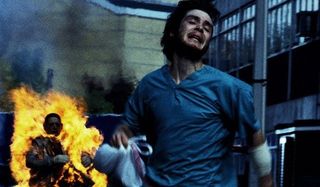
1. 28 Days Later... (2002)
The debate over whether or not it is accurate to call director Danny Boyle and writer Alex Garland’s chaotic tour de force a “zombie” movie is a little pointless to me.
Sure, the plot revolves around agile maniacs infected by biological rage as opposed to slow-moving dead people, yet that is precisely what makes it the most realistic “zombie” movie of all time.
The story picks up speed after Jim (Cillian Murphy) wakes up from a coma four weeks after a virus that is non-fatal, but turns most of London into senseless, adrenaline-fueled predators, breaks out. Not even simply avoiding a bite can save you as Brendan Gleeson’s fate shows that a single drop of blood entering your eye is enough to awaken the rage.
28 Days Later... makes the concept of society crumbling in the wake of disease scarier than the stories that inspired it because it forces you to believe it could happen.
What do you think of our realistic zombies movies ranking? Still not convinced, or are you prepping to zombie-proof your house now? However you feel about zombie movies, hopefully you can survive long enough to check back for movie updates and more here on CinemaBlend.

Jason Wiese writes feature stories for CinemaBlend. His occupation results from years dreaming of a filmmaking career, settling on a "professional film fan" career, studying journalism at Lindenwood University in St. Charles, MO (where he served as Culture Editor for its student-run print and online publications), and a brief stint of reviewing movies for fun. He would later continue that side-hustle of film criticism on TikTok (@wiesewisdom), where he posts videos on a semi-weekly basis. Look for his name in almost any article about Batman.
Most Popular





